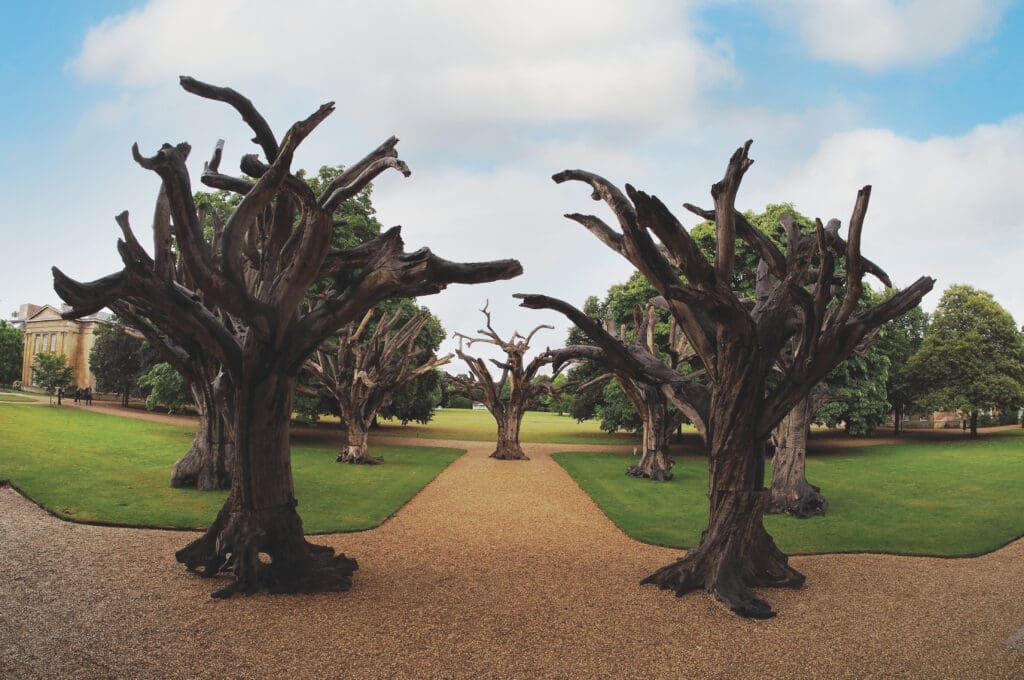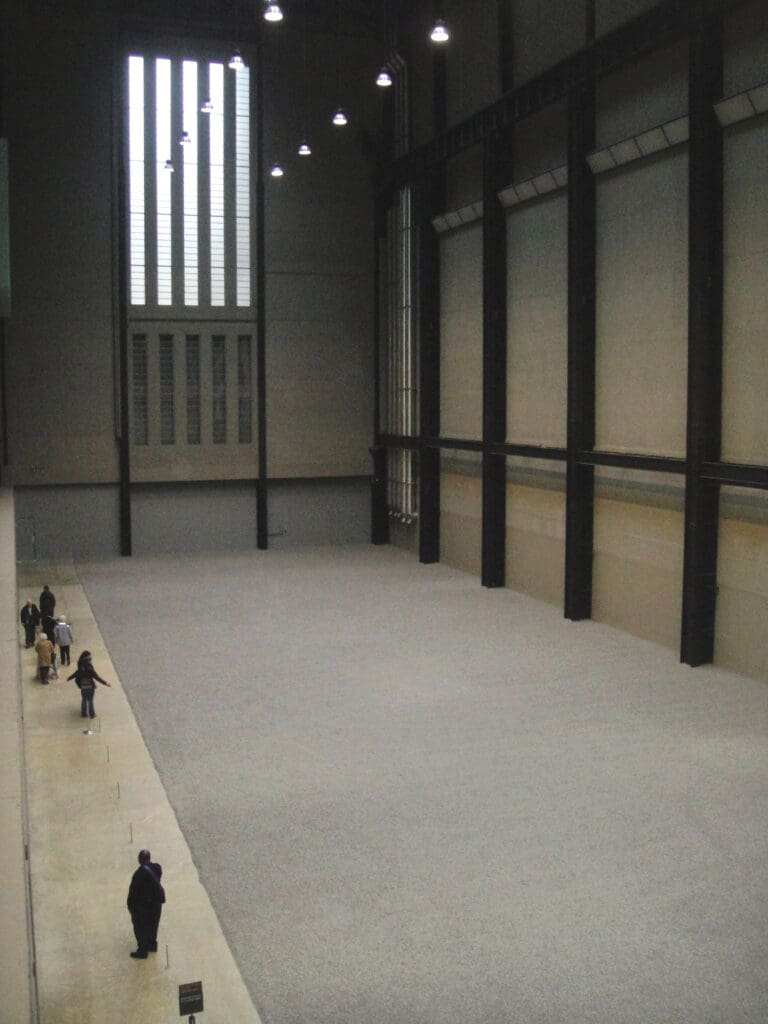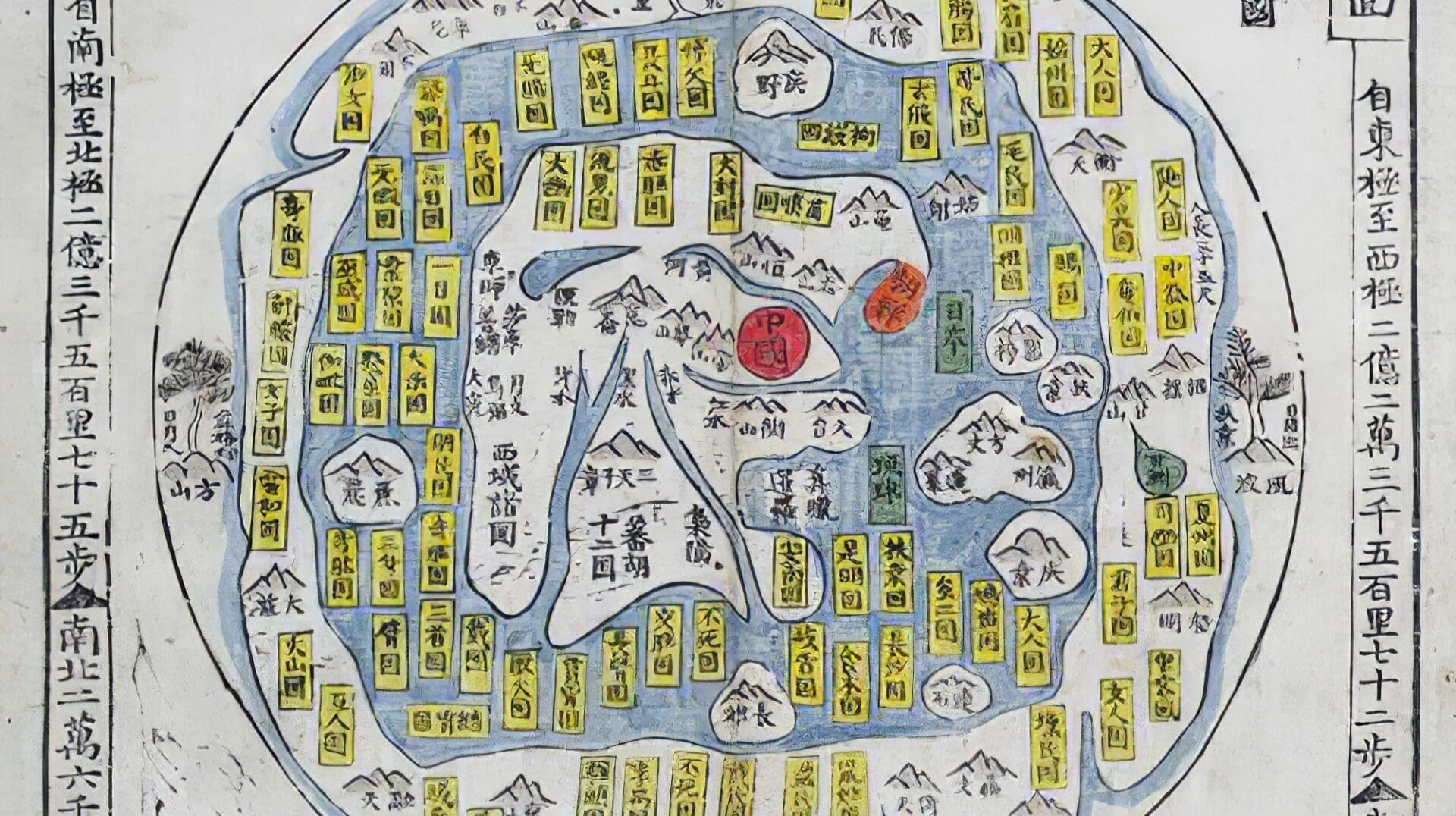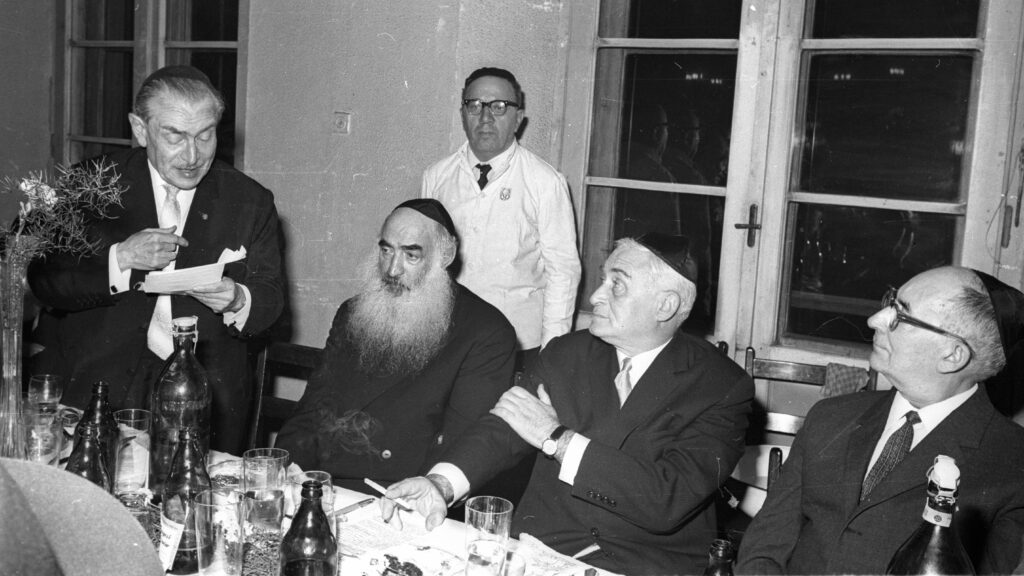This article was published in Vol. 3 No. 3 of our print edition.
Why are Western conservative thinkers so popular in China? One would expect them to be shunned and universally opposed. After all, China is ruled by a Leninist party-state, a device for ruthless revolutionary transformation, and arguably the most anti-conservative form of political organization in human history. Also, China’s leading political-philosophical traditions—New Confucianism and socialism with Chinese characteristics—do not overlap with Western conservative canons. Nevertheless, Chinese intellectuals are surprisingly enthusiastic about Western conservative authors and viewpoints. Samuel Huntington and Leo Strauss enjoy star status, and Chinese interpretations of American politics often parallel those of American conservatives. These likes and dislikes undoubtedly have all kinds of causes, which cannot possibly all be disentangled here. But I will argue that one such cause is a profound philosophical affinity: a strong sense of society’s integral cultural holism.
To be clear, I will not claim that Chinese intellectual life is overall hospitable to the concerns of Western conservatives because it is not. Though some of its dominant features resonate well with Western conservatism, others are deeply unchristian and anti-Western; take the belief in moral perfectibility and Sino-centric imperial imaginings. Also, most Westerners would of course find the political censorship in China suffocating. Yet none of that should surprise given the nature of China’s regime and political history. Fascinating are the convergences that defy the divergence.
I. First, Chinese academia is delightfully incongruent with the norms dominant in the North American humanities, dispelling the spectre of a global normative isomorphism that so terrifies anyone with philosophical inclinations. In fact, it is almost as if Chinese academia purposefully inverted all the concerns of progressive North America, celebrating conservative thinkers from the West and decrying the progressive identity politics radiating from North American campuses. The standard Chinese term for progressive identity politics—baizuo or ‘white left’—is derogatory, code for harmful idiocy, and used in this sense even by scholars with pro-American credentials like historian Xu Jilin.1 Meanwhile, some middle-aged Chinese who lived through Maoist social justice during the Cultural Revolution (1966–1976), including in their ranks artist Ai Weiwei,2 are downright allergic to baizuo idealism, which reminds them of the great lies told in the name of progressive egalitarianism.
Some of these allergies and instincts carry over into social and political theory. The Western thinkers in whom the Chinese intellectual mainstream is most interested are deeply at odds with the West’s progressive, left-liberal intellectual establishment. Samuel Huntington, for example, is an all- time favourite in mainland Chinese social and political thought. When I worked at Peking University a few years ago, I noticed that Huntington is cited frequently and read religiously. ‘Huntington, a cultural conservative, is strangely beloved by many Chinese intellectuals, even Chinese liberals’, observes David Ownby of the Center of East Asian Studies at Montreal University.3
But there is a logic here: Huntington disentangles modernization from liberal democracy and proposes a civilizationalist worldview, both concepts which fall on fertile ground in China. His Political Order in Changing Societies (1968) argued that political order and state capacity are more important predictors of modernization than whether a country is liberal democratic. Incidentally, this decoupling of modernization and liberalization is exactly what the Chinese Communist Party (CCP) has placed its bet on. We have a match. ‘Huntington criticized Western political theory for its ideological dogma that liberal democracy represents the highest political ideal’, concludes Jiang Shigong, a legal philosopher at Peking University and leading academic interpreter of ‘Xi Jinping Thought’.4
Huntington’s Clash of Civilizations (1996) has become an even bigger hit, though the clash aspect initially rubbed Chinese scholars up the wrong way. Its insistence on the geopolitical importance of civilizations and cultures, however, is overwhelmingly persuasive and influential.5 Chinese intellectuals, living outside the West but familiar enough with its categories of thought to face culture shock, are viscerally aware of how deep civilizational and ideological divides can be. Moreover, the book’s culturalistic angle corresponds to China’s official self-understanding: CCP propaganda plays the culture card in arguing that China is culturally too different to adopt Western-style liberal democracy. The consensus throughout China’s politico-intellectual ecosystem is that states should respect one another’s political systems and manage cultural and political differences; they should not aim to eradicate them.
Huntington’s call for ‘inter-civilizational dialogue in difference’, as literature professor Jin Huimin of Sichuan University puts it, approximates the official party line so closely that it is ‘as if’ Xi is ‘intentionally responding to Huntington’s expectations and concerns’.6 Since Jin wrote these words, Xi has in 2022 launched his Global Civilizations Initiative, for which he flew in foreign delegates in March 2023, and which calls on people to ‘respect the diversity of civilizations’.7 Its multi-civilizationalist framework, though distinctly modern in constructing tradition through the lens of Romantic cultural particularism, is said to draw on wisdom from China’s civilizational history. As the CCP’s English-language newspaper Global Times transmitted the party doctrine: ‘China’s 5,000-year civilization is the backbone of these great thoughts and initiatives as it helps build upon our existing values and concepts of civilization and pushes forward continuous theoretical innovation.’8
‘The consensus throughout China’s politico-intellectual ecosystem is that states should respect one another’s political systems and manage cultural and political differences; they should not aim to eradicate them’
Hence, in Chinese scholarly discourse, it is not only entirely acceptable, but also encouraged—perhaps now even state mandated—to paint a Huntingtonian world of civilizational blocks that must find ways to live together peacefully. In Western academia, by contrast, good form requires that one only cite Huntington’s civilizational thesis disapprovingly, deconstructing his supposedly dangerous notion of Western civilization or dismissing his ‘essentializing’ accounts of national cultures.
Another thinker from American academia whose theories today fare better at Chinese universities is German-American political philosopher Leo Strauss. Strauss, who entered the US as a refugee from Nazi Germany, ascended to an influential professorship at the University of Chicago. Though his oeuvre left a prominent legacy in American intellectual life outside the academy, it has a marginal presence within it, where the last lovers of its contrarian assaults on modern political philosophy are confined to a few heterodox holdouts. How different is the situation in China, where Strauss has gained a ‘cult following’ among academic philosophers, as Matthew Dean observed in Tablet Magazine.9 The Chinese translators and collectors of his oeuvre even got so enthusiastic that, at present, ‘more Strauss is available in print in Chinese than in English’.10 The two pioneers of Chinese Straussianism, Liu Xiaofeng and Gan Yang, preface every volume in their co-edited series ‘Sources of Western Scholarship’ with a warning that their Chicago teachers would have approved of: ‘Chinese scholars who embrace a healthy reading of the West maintain an attitude of scepticism toward the systems of Western thought, and are even more vigilant in the face of the various fashionably strange theories found on Western college campuses.’11
What attracts Chinese scholars to Strauss’s works? According to Chicago political scientist Mark Lilla, who wrote an essay on this question after spending time in China in 2010, it is the widespread dissatisfaction with liberal conceptions and Strauss’s ‘idea of an elite class educated to serve the public good’, which resonates with China’s Confucian tradition. And Chinese readers, he adds, appreciate that Strauss takes them on a grand tour of Western political philosophy.12
An additional factor, I suspect, is Strauss’s sociology, which matches a Chinese preference for cultural holism. Drawing on the Greek tradition, he views societies as politico-cultural wholes, each with a particular overall character that is at once cultural and political. This character is its politeia, or in his translation of the Greek term, its regime: ‘Regime means that whole, which we today are in the habit of viewing primarily in a fragmentized form; regime means simultaneously the form of life of a society, its style of life, its moral taste, form of society, form of state, form of government, spirit of laws.’13
Chinese thinkers are still close to this regime perspective. It is, for example, how Wang Huning approached American society in his 1991 travel memoir America against America. Wang—who was then a professor of international politics but has since become one of China’s top political figures—tried to capture the overall spirit of American life. This permitted him to note that Americans have a different, more fragmenting social imagination, which, in his judgement, makes Americans incapable of grasping the interlinked nature of their country’s ills. Here is how N. S. Lyons in Palladium summarizes Wang’s argument:
‘But while Americans can, [Wang] says, perceive that they are faced with “intricate social and cultural problems”, they “tend to think of them as scientific and technological problems” to be solved separately. This gets them nowhere, he argues, because their problems are in fact all inextricably interlinked and have the same root cause: a radical, nihilistic individualism at the heart of modern American liberalism.’14
There is a pattern. Like Wang, Jiang, Jin, and the Chinese intellectual mainstream, Strauss and Huntington conceive political life as deeply embedded in distinct national and regional ‘forms of life’, that is, in what we commonly call ‘cultures’. We have arrived at a profound philosophical affinity.
II. The Chinese intellectual sphere has certain doxas—prevailing assumptions about the nature of society, morality, and political order—that match Western intellectual conservatism rather well and cut straight across socialist, New Confucian, and liberal divisions. One such doxa, arguably the most fundamental one, is the preconception that societies have a thick moral-cultural substance, with national cultures and civilizations forming relatively cohesive, thickly integrated units.
A doxa is not something that everyone in a society believes. Instead, it is an assumption so widely considered evident that it can set the gravity in a particular intellectual field. Violate a doxa, and you will face an uphill battle in discussions. Doxas evade the burden of proof, which they put on dissenters. They concern the kind of assumptions that can usually be left unexplored and unsupported without this undermining the discourse’s presumed standing. Thought on society and politics can never be entirely free from normative and factual assumptions, and it is not humanly possible to explore and argumentatively support all the implicit assumptions in a single discourse, conversation, or text, no matter how theoretically robust. A doxa, therefore, is an ‘everyone knows’ that grants you some slack when communicating ideas, a permission to leap ahead, to proceed with the argument despite a lack of perfect foundations. In the Chinese academy, in contrast to Western humanities departments, the ‘everyone knows’ works in favour of a culturalistic, ‘thick’ sociology. A corollary is that China and the West are viewed as different and distinct civilizational units.

III. Regarding culture and societal cohesion, Chinese and Western academia have not always been as far apart as they are today. The founding figures of Western sociology were still close to a holistic cultural perspective, conceiving societies as organic wholes, or as distinct arenas of conflict and resource allocation. Of course, there was internal diversity, too: French sociologist Émile Durkheim (1858–1917) and German sociologist Max Weber (1864–1920) famously highlighted how modern societies had become more internally differentiated on the level of professions and value spheres. Still, for Durkheim, modern societies continue to have a communally shared social imagination. And even though Weber was more attuned to value conflicts within single cultures than Durkheim was, his studies of the socio-economic legacies of the various world religions essentially compare different civilizations. They cover the worlds of Christianity, Islam, Hinduism, and China, each consisting of a unique dynamic of competing values and traditions. In Western academia, such comparative civilizational theorizing was perhaps last entirely respectable when, in 1963, Israeli sociologist Shmuel Eisenstadt’s book The Political System of Empires laid out how Europe, Japan, China, and Islam had produced different versions of modernity.
Since then, however, fragmenting visions have reigned supreme. The established etiquette in Western academia is not to ‘reify’ or ‘essentialize’ national cultures and avoid terms like ‘civilization’ and ‘Western world’, which can stimulate jingoism and even further the ideological oppression of non-Western peoples. In general, large cultural units are suspect. It is fine to attach the adjective ‘cultural’ to micro groupings. Subcultures are fine. But postulating something like ‘American culture’ would seem overly collectivist and stereotyping and insufficiently attuned to diversity.
Worse, it would benefit nationalist framings, which happens to be the politics that most professors and students strive to disassociate themselves from. Research shows that American professors overwhelmingly lean Democrat15 (which probably also, in part, reflects the Republican Party’s populist turn in recent years). Similarly, European professors, as sociologist Van de Werfhorst found, have, with minimal variation, ‘more liberal orientations’ toward migration, which indicates an aversion to nationalism.16 Western academics are quick to get uncomfortable, not only with research designs that reproduce national taxonomies in the cultural domain, but also with social theories that grant cultural substance to national units. Instead, they like to see thin subcultures and creative identity constructions alongside formal institutions and globalization—anything is fine, really, as long as it breaks open the suffocating patchwork of national attachments and civilizational blocks.
Now, this scholarly etiquette of avoiding cultural and national stereotypes is certainly not unreasonable. On the contrary, it is usually more conducive to sophisticated social analysis than a total disregard for such concerns, as Chinese excesses in the latter direction illustrate. Many Chinese scholars sprinkle their texts with ancient civilizational essences without providing any argumentative support. Sweeping civilizational musings are ubiquitous. Jiang Shigong, for example, posits a mysterious North Asian ‘steppe empire’ that somehow corporates both the Mongolian and the Russian imperial tradition.17 It stands, he writes, alongside Eurasia’s four traditional civilizations: ‘Chinese Confucian civilization, South Asian Hindu civilization, Arabic-Islamic civilization, and Euro-Christian civilization.’18 In late modernity, these four traditional civilizations and the steppe empire came to be dominated by the ‘British–US-created world empire’, i.e., ‘the world empire 1.0’, which, in turn, in the foreseeable future, will be replaced by a Sinocentric ‘world empire 2.0’.19 All that Jiang crams into just a few paragraphs.
But just as Chinese theorists often succumb to sweeping culturalistic generalizations, Western academia often overshoots in the opposite direction, being overly averse to the findings of cultural comparisons and underestimating the extent to which human cultural life, to a great extent, is still patchworked in its geographic distribution. Of course, cultures are not perfectly disjunctive; they come with porous border zones, coextensions, diasporas, subgroupings, local variations, competing social collectives, and free-roaming individuals with unique identity assemblages. Yet Western academia’s near-exclusive and instinctive focus on the intersections and blurriness can obscure how patchworked much of cultural and political life on earth nonetheless still is.
In their study ‘On Nationology’, Plamen Akaliyski, Christian Welzel, and Michael Minkov compare the explanatory power of national units in the World Value Survey to that of alternative grouping units like religion and ethnicity. It turns out that ‘nations capture the bulk’ of the explainable variation in individuals’ cultural values.20 ‘Contrary to many scholars’ intuitions, alternative social aggregates, such as ethnic, linguistic, and religious groups, as well as diverse socio-demographic categories, add negligible explained variance to that already captured by nations.’21 That is, nations are real units of culture.
Sociologists Inglehart and Welzel, with their famed world culture map, had already shown that nations in the World Value Survey, in turn, cluster into larger world regions or civilizations.22 Focusing on the critical variables of secularism and self-expressive values, they drew groupings labelled ‘Protestant Europe’, ‘English-speaking’, and ‘Confucian’. It appears, then, that our cultural world, to a large extent and in key respects, is one of ‘people within nations’ and ‘nations within world regions’. So, the Chinese tendency to imagine a world of cultural ‘blocs’ is not wildly off. As a starting point, it is probably sounder empirically than forced Western attempts to think outside the box on this matter.
IV. More generally, there is virtue to the simplicity of Chinese intellectual discourse; to the confident ease with which Chinese authors posit concepts and dare to stay close to everyday common sense. Sinologist and comparative political theorist Thomas A. Metzger of the Hoover Institute speaks in this context of China’s ‘epistemological optimism’.23 Metzger, who turns ninety next year, has written thick volumes on how Chinese intellectual life did not go through what he coined ‘the Great Modern Western Epistemological Revolution’.24 In hundreds of dense pages comparing modern Chinese theorists to the likes of Descartes, Hegel, Popper, and Hayek, Metzger identifies a deeply pessimistic strand in modern Western epistemology that has no equivalent on the Chinese side and makes Western thinkers doubt the existence of even the most common things.
Like a snake biting its tail, Western sceptical chic, ironically, has also led Westerners to doubt the existence of the West (though this is much less of a conservative predilection). Whereas a Chinese author might assume that something so frequently talked about must be real in some way or another, Ghanese American philosopher Kwame Appiah of New York University turns this around: ‘If western culture were real, we wouldn’t spend so much time talking it up.’25 His otherwise sophisticated essay ‘There Is No Such Thing as Western Civilization’ shows that the term ‘the West’, historically, has had different meanings and has been used with various political motives. From there, he jumps to the unfortunate conclusion that the term, on any definition, lacks a substantive referent—which, pace Appiah, is a signature Western move.

Such attempts at conceptual deconstruction certainly are a more complex mode of analysis than carefree Chinese references to Western civilization. But complexity can make one miss the forest. In this case, the deconstructive discourses create a misleading overall image of the concept’s status in world affairs. They are so busy unmasking ‘the West’ that they overlook that the concept is not the exclusive property of Western ideologues and instead plays a central role in, for example, Chinese political thought. A cause of this oversight is the legacy of Said’s Orientalism (1978). Though Said’s essay more narrowly focuses on British and French depictions of the Near East, many of its Western acolytes soon extrapolated the overgeneralizing thesis that the inherent, latent function of discourses about ‘the West’ and ‘the East’ is always to demote anything Eastern or non-Western.
Now, it is true that West–East dichotomies are often profoundly ideological; it is just that Westerners are not the only ones playing the ideology game. The dichotomies in question are co-constructed by players with radically different, even opposed, polemical intents. It so happens that the CCP—the world’s single most powerful political organization—is the biggest propagator of essentialist East–West dualisms. Also, ‘the West versus China’ is a whole genre of Chinese intellectual life,26 with roots in early twentieth-century pan-Asianist thought. Historically, the dualistic conception emerged, not as a unilateral declaration of superiority from London or New York, but from late-nineteenth-century cultural contact, as is shown by historical studies such as Cemil Aydin’s The Politics of Anti-Westernism in Asia and Alastair Bonnett’s The Idea of the West. In cultural contact zones, Asian activists rebelled against European colonialism and American political influence. Early twentieth-century pan-Asianism, which at times enjoyed significant support among intellectuals and politicians in Japan and China, sought to unify the Asian nations against Western dominance. Its central tenet was an essentialist dichotomy in which the West stood for domination and the East for harmony.
Today, this dichotomy reappears in the prominent Chinese theory about the West’s supposed ‘Roman’ character. According to this theory, Western and particularly American foreign policy and liberal-democratic universalism—Jiang Shigong’s version speaks of America’s ‘new Roman empire’—are driven by an aggressively expansionistic ‘Roman’ spirit.27 This Roman spirit seeks to recreate the world in its image. In contrast, the Chinese civilizational essence is, or so the argument goes, friendly to all human diversity and capable of harmonizing all cultures and political systems (a state of harmony sometimes referred to as ‘tianxia’, as will be discussed below). Hence, the world has two world empires, an established, Western one and a rising, Sino-inspired one.
V. Clearly, despite sharing some terms and conceptions, the Chinese doxas that resonate well with Western conservatives, such as the holistic and culturally substantive view of society, tangle up with doxas that conservatives will abhor. One such unconservative doxa is the utopian belief that leaders and society are morally perfectible, which allows modern Chinese philosophers to expect that selfishness and partiality will one day disappear from people’s hearts. When I first stumbled upon this belief in my readings of Chinese philosophy, I could not get myself to take it seriously. It just seemed too strange to me. I only realized how real it was when a high schooler I tutored in Beijing in 2017 suggested, on various occasions, that having discussions with people was useless as ‘discussions are soon going to end’ anyway. Intrigued, I invited him to share his reasoning. He explained that a unifying moral truth would soon emerge, after which people would have nothing substantial to disagree about. Why bicker when disagreement itself is about to become obsolete?
This bright, sincere teenager echoed a broader strand in Chinese political thought, one deriving from what Metzger labels ‘Chinese utopianism’.28 Metzger provides a sympathetic account but also warns that its premises can lead Chinese thinkers to underestimate the importance of institutional safeguards against the abuse of political power. After all, if you can select and then educate morally perfect leaders, then, yes, that should be the focus. And once you have such leaders, checks and balances, independent media, and public scrutiny will be redundant. Why monitor excellent people who have no evil temptations? Of course, such moral utopianism conflicts with the core of Western conservatism. Whether Burkean, Hayekian, or theological in persuasion, a robust conservatism proceeds from the Christian notion of human fallibility. Hence, it accepts that sin is an ineradicable feature of human existence and seeks to impose safeguards against the worst abuses of power.
‘The Chinese intellectual sphere has certain doxas…that match Western intellectual conservatism rather well and cut straight across socialist, New Confucian, and liberal divisions’
What cannot charm Western conservatives either are Chinese intellectuals’ recent attempts at formulating alternative world visions in which an idealized China stands central, serving as the globally leading socio-political model. The neo-traditionalist Tianxia School of thinkers like Zhao Tingyang and Xu Jilin prophesizes the return of tianxia, or ‘all under heaven’. Tianxia is a concept from classical Chinese philosophy and cosmology that, historically, had various meanings, sometimes referring to everything on earth and sometimes only to imperial China’s sphere of influence or the civilized world. China’s contemporary tianxia theorists take this self-idealization of China’s ancient past and put it in the future, formulating a utopian vision for a politically integrated future world in the style of Kang Youwei, a late Qing reformer. Like Kang, who wrote his most influential works around the turn of the twentieth century, they claim that global harmony is on the horizon. The future tianxia world will have the same inclusive, cosmopolitan nature as the ancient tianxia supposedly had, but will manifest, not just in China and East Asia, but on a truly global scale. The emergence of tianxia would be a moral revolution, transforming people’s hearts, harmonizing all cultural and political diversity, and removing diplomatic tensions. As Zhao claims in his book All under Heaven (2021), the future tianxia is marked by an ‘unlimited compatibility’ with locally-varied ways of living. Under the tianxia order, cultures and political systems will respect each other.29 America will no longer seek to delegitimize non-liberal regimes with narrowly Western human rights criticism. People will impartially evaluate world problems from a commitment to the world in general. And politics will be about friendship: ‘Politics must become an art for transforming enmity into friendship rather than a technology for coping with competitive conflict.’30
One seeming contradiction is that tianxia, on the one hand, will be an all-encompassing totality that equally includes all the world’s parts but, on the other, has a special connection to a specific part of the world, namely China. It is a bit like American exceptionalism simultaneously claiming universal values. Zhao squares this circle by arguing that ‘China is a “microcosm” of tianxia because China is a “world-patterned state” that takes tianxia to be internal to its structure.’31 For Xu, China has a special world-historical mission as the ‘world nation’.32 It is currently falling short of that mission by being a normal nation state in the grips of nationalism, Xu writes in his essay ‘The New Tianxia’. But a China that is true to itself is ‘a cosmopolitan power, bearing Hegel’s “world spirit”’.33
Critics accuse the Tianxia School of harbouring imperialist inclinations. In 2008, political scientist William Callahan was the first to sound the alarm in his perhaps less than fully generous account: ‘Rather than guide us toward a post-hegemonic world order, Tianxia presents a new hegemony where imperial China’s hierarchical governance is updated for the twenty-first century.’34
Be that as it may, the Tianxia School brilliantly illustrates how, in Chinese political thought, the doxas and ideas that resemble those of Western conservatism intertwine in complex ways with those that negate its creed. Society has moral substance, culture matters, and civilizations are real, but moral utopia is possible, the political West is overbearing, and the future of the world lies buried in the history of China. Take the following statement by Xu:
‘A country’s internal order of justice requires powerful common values with substantive content; it cannot use an expedient ‘overlapping consensus’ as its base. [“Overlapping consensus” refers to philosopher John Rawls’s idea that social institutions should be organized around a minimalist liberal framework.] But for many axial civilizations [civilizations like China], the elements of international society that co-exist with national culture, and the use of Western human rights standards as the core value of “the law of peoples”, has appeared to be too substantive. Internally, the nation state requires a thick common rationality, while international society can only establish a thin minimalist ethics. Such minimalist ethics can only take the “overlapping consensus” of different civilizations and cultures as its foundation: this is the de-centred, non-hierarchical shared universality that the new tianxia seeks.’35
What is being stated here? First, that national societies are too substantive, morally, to agree on nothing but a few liberal rules of the game. If a national society would merely share a thin consensus around, for example, liberal human rights, then it would not hang together at all. Second, that liberal human rights, though too thin for a nation state, are too thick to serve as the international order’s shared framework since they are not universal but rooted in Western culture. Finally, that a Huntingtonian world of civilizations does need a shared, truly universalistic framework to ensure enduring peaceful coexistence. For Xu, the solution is tianxia, a utopian projection of an idealized Chinese past. The Sino-inspired universality he postulates—a universality open to all cultural and civilizational diversity—resembles Xi Jinping’s Global Civilization Initiative that calls on humanity to cherish ‘the diversity of civilizations’ from a grounding in ‘the common values of humanity’.36
Can this civilizational universalism, the Tianxia School, Chinese intellectual life in general, or China’s broader politico-ideological ecosystem therefore said to be ‘conservative’? No, none of these are conservative in any relevant, politico-theoretical sense, though some of their underlying assumptions, taken in isolation, overlap with conservative ones. In the end, one simply cannot put something as complexly different as the Chinese intellectual field onto either the American left–right axis or the West-European ideological taxonomy. Ultimately, the Chinese field is a different world, albeit one that bears affinities with, and shows much interest in, us Western conservatives. Perhaps we can be interested in return and even muster sympathy, or at least some tolerance. After all, so long as tianxia has not harmonized away all disagreement, it will be necessary to coexist while disagreeing about many things.
NOTES
1 ‘许纪霖x刘擎x白彤东x吴冠军: 反思‘黑命攸关’运动’ (Xu Jilin, Liu Qing, Bai Tongdong, and Wu Guanjun Reflect on ‘Black Lives Matter’), 澎湃思想市场 (Pengpai Intellectual Marketplace) (3 July 2020), https://mp.weixin.qq.com/s/Ozo6ZTK1VvB5Rrc9h8w81w, accessed 10 July 2023.
2 Ai Weiwei interviewed by Margaret Hoover, Firing Line with Margaret Hoover, PBS (11 December 2021).
3 David Ownby’s introduction to his translation of Jiang Shigong’s ‘The Critical Decade’ on Reading the Chinese Dream, www.readingthechinadream.com/jiang-shigong-ten-crucial-years.html, accessed 10 Jul. 2023.
4 Jiang Shigong (强世功), ‘中美‘关键十年’: ‘新罗 马帝国’与‘新的伟大斗争’’ (The ‘Critical Decade’ in the Sino–American Relationship: the ‘New Roman Empire’ and the ‘New Great Struggle’), Aisixiang (May 2020), www.aisixiang.com/data/122877.html, accessed 10 July 2023.
5 David Ownby’s introduction to his translation of Xu Jilin’s ‘Political Correctness and Identity Politics’ on Reading the Chinese Dream, www.readingthechinadream.com/xu-jilin-political-correctness-and-identity-politics.html, accessed 10 July 2023.
6 Jin Huimin, ‘Cultural Self-Confidence and Constellated Community: An Extended Discussion of Some Speeches by Xi Jinping’, Telos, 195 (Summer 2021), 106.
7 Xu Liuliu, Li Qian, and Hu Yuwei, ‘The Global Civilization Initiative Full of Chinese Wisdom, Injects Fresh Momentum into Bright Shared Future’, Global Times (17 April 2023), www.globaltimes.cn/page/202304/1289306.shtml, accessed 18 Jul. 2023. 8 Liuliu, Quian, and Yuwei, ‘The Global Civilization Initiative’.
9 Matthew Dean, ‘Reading Leo Strauss in China’, Tablet Magazine (1 February 2022), www.tabletmag.com/sections/arts-letters/articles/leo-strauss-china, accessed 10 July 2023.
10 Dean, ‘Reading Leo Strauss in China’.
11 ‘重新阅读西方’ (Re-Reading the West), the introduction to the西学源流 (Sources of Western Scholarship) series co-edited by Liu Xiaofeng and Gan Yang. Translation by Matthew Dean on Reading the China Dream, www.readingthechinadream.com/gan-yang-and-liu-xiaofeng-re-reading-the-west.html, accessed 10 July 2023.
12 Mark Lilla, ‘Reading Strauss in Beijing’, The New Republic (17 December 2010), https://newrepublic.com/article/79747/reading-leo-strauss-in-beijing-china-marx, accessed 10 July 2023.
13 Leo Strauss, ‘What Is Political Philosophy?’, The Journal of Politics, 19/3 (August 1957), 362–363.
14 N. S. Lyons, ‘The Triumph and Terror of Wang Huning’, Palladium Magazine (11 October 2021), www.palladiummag.com/2021/10/11/the-triumph-and-terror-of-wang-huning/, accessed 10 Jul. 2023.
15 Mitchell Langbert and Sean Stevens, ‘Partisan Registration of Faculty in Flagship Colleges’, Studies in Higher Education 47/8 (2022).
16 Herman G. van de Werfhorst, ‘Are Universities Left-Wing Bastions? The Political Orientation of Professors, Professionals, and Managers in Europe’, The British Journal of Sociology Volume, 71/1 (2020), 47–73.
17 Jiang Shigong, ‘超大型政治实体的内在逻辑: ‘帝 国’与世界秩序’ (The Internal Logic of Supersized Political Entities: ‘Empire’ and World Order), Aisixiang (April 2019), www.aisixiang.com/data/115799.html, accessed 11 July 2023.
18 Shigong, ‘超大型政治实体的内在逻辑: ‘帝国’与世界秩序’. The above citation is my translation of ‘儒教中华文明区域, 印度教南亚文明区域, 伊斯兰教阿拉伯文明区域与基督教欧洲文明区域.’
19 Shigong, ‘超大型政治实体的内在逻辑: ‘帝国’与世界秩序’. The respective terms here are ‘英美缔造的世界帝国’ (British-US-created world empire), ‘世界帝国的第一版’ (the world empire 1.0), and 世界帝国的第二版 (world empire 2.0).
20 Plamen Akaliyski, Christian Welzel, and Michael Minkov, ‘On “Nationology”: The Gravitational Field of National Culture’, Journal of Cross-Cultural Psychology, 52/8–9 (October–November 2021), 771.
21 Akaliyski, Welzel, and Minkov, ‘On “Nationology”. 22 ‘The Inglehart-Welzel World Cultural Map 2023’, www.worldvaluessurvey.org/images/MAP20232.png, accessed 11 July 2023.
23 Thomas Metzger, ‘Western Philosophy on the Defensive’, Philosophy Now (2000), https://philosophynow.org/issues/26/Western_Philosophy_ on_the_Defensive, accessed 11 July 2023.
24 Thomas A. Metzger, A Cloud across the Pacific: Essays on the Clash between Chinese and Western Political Theories Today (Hong Kong: Chinese University Press, 2005), 37–50.
25 Kwame Anthony Appiah, ‘There Is No Such Thing as Western Civilisation’, The Guardian (9 November 2016), www.theguardian.com/world/2016/nov/09/western-civilisation-appiah-reith-lecture, accessed 11 July 2023.
26 Zhang Cheng (张城), ‘中国道路的方法论: 以中 国为中心, 以中国为方法’ (The Methodology of the Chinese Path: China as Center and Method), 开放时代 (Open Times) (15 March 2021), https://mp.weixin.qq.com/s/6WfcXd17wU9vnvQEEutUcg, accessed 11 July 2023.
27 Jiang Shigong, ‘中美‘关键十年’’, Aisixiang (May 2020).
28 Metzger, A Cloud across the Pacific, 699–709.
29 Zhao Tingyang, All under Heaven: The Tianxia System for a Possible World Order (Oakland, CA: University of California Press, 2016), 59.
30 Tingyang, All under Heaven, 25.
31 Tingyang, All under Heaven, 124.
32 Xu Jilin (许纪霖), ‘新天下主义: 重建中国的内外秩序’ (The New Tianxia-ism: Rebuilding China’s Internal and External Order), Aisixiang (26 August 2015), www.aisixiang.com/data/91702.html, accessed 11 Jul. 2023.
33 Jilin, ‘新天下主义: 重建中国的内外秩序’. Full quote: ‘China is a cosmopolitan power, a world nation bearing Hegel’s “world spirit”, and should assume responsibility for the world and its world-spiritual inheritance, which is the new tianxia that will appear in the form of universal values.’ (‘中国是一个世界性大国, 是黑格尔所说的负有‘世界精神’的世界民族, 理应对世界承担责任, 对传承‘世界精神’承认责任,这个‘世界精神’, 就是在普世价值形态出现的新天下主义.’)
34 William A. Callahan, ‘Chinese Visions of World Order: Post-Hegemonic or a New Hegemony?’, International Studies Review, 10/4 (December 2008), 749.
35 Xu Jilin, ‘新天下主义’ (The New Tianxia-ism), translated by David Ownby on Reading the Chinese Dream, www.readingthechinadream.com/xu-jilin-the-new-tianxia.html, accessed 11 July 2023.
36 Liuliu, Qian, and Yuwei, ‘The Global Civilization Initiative’.
Related articles:








